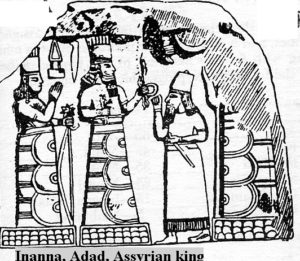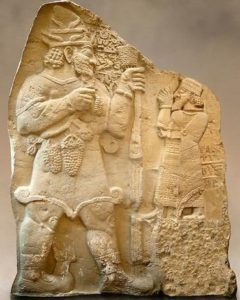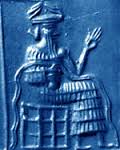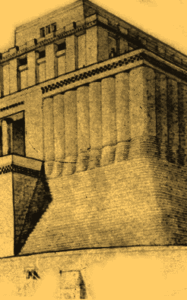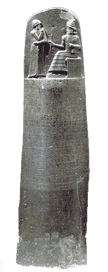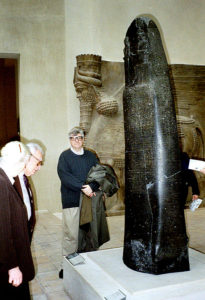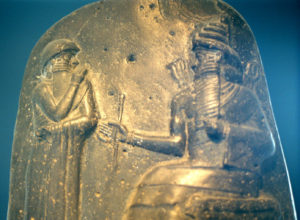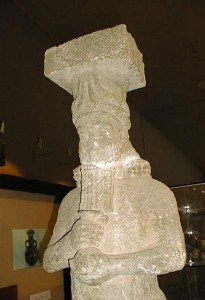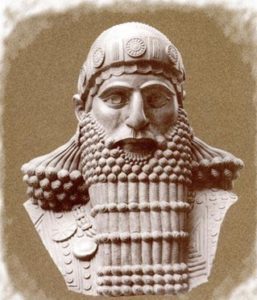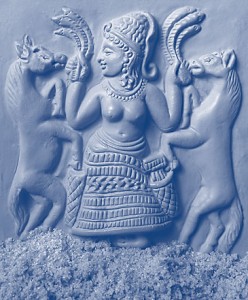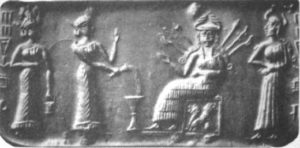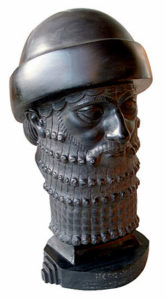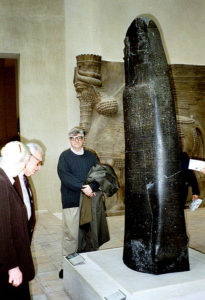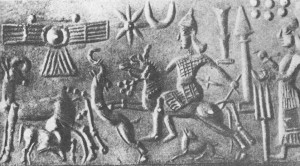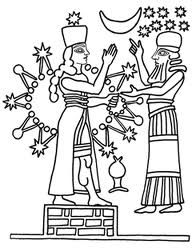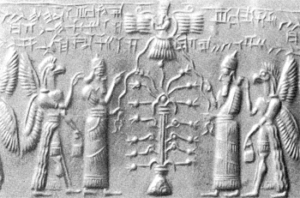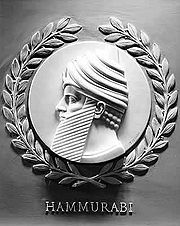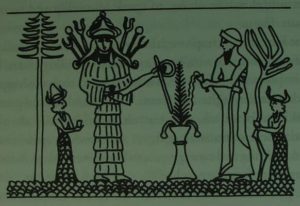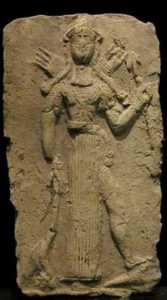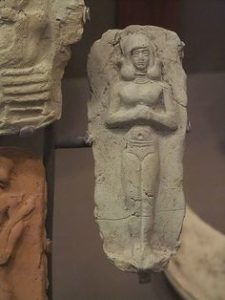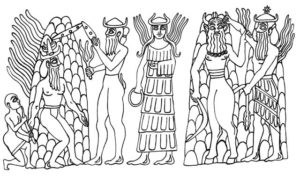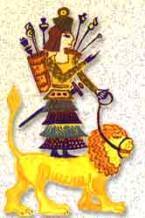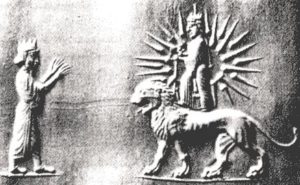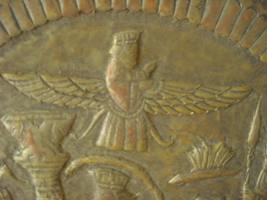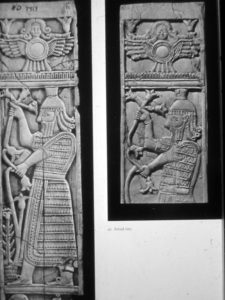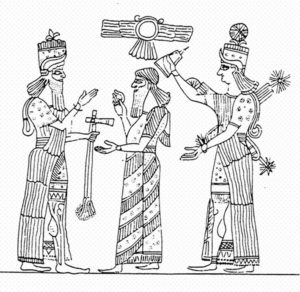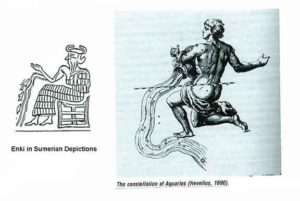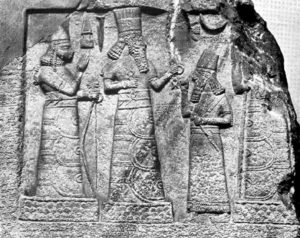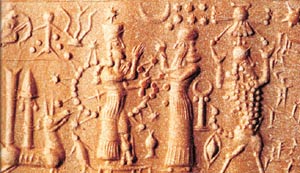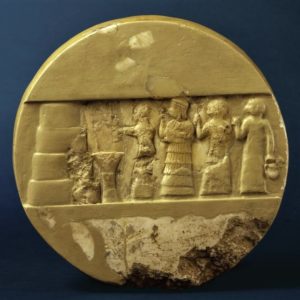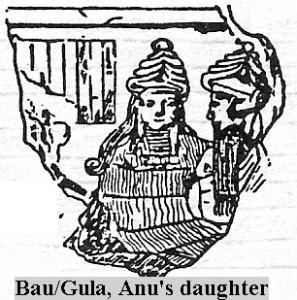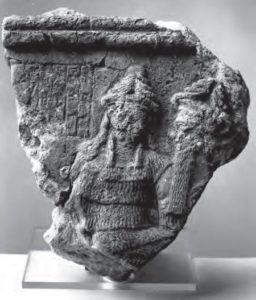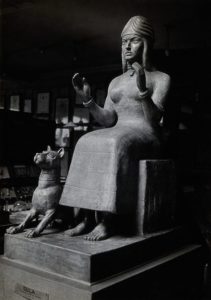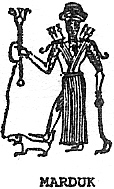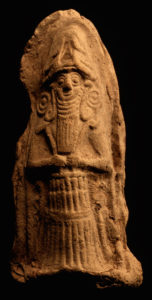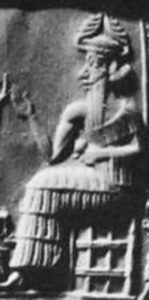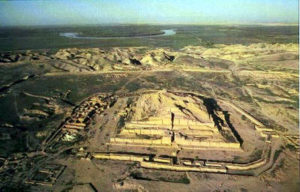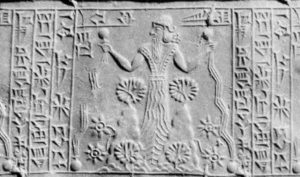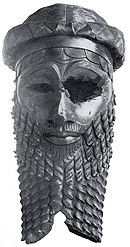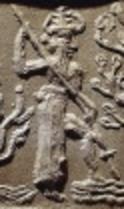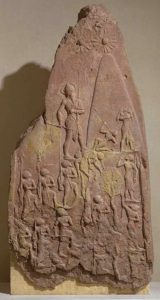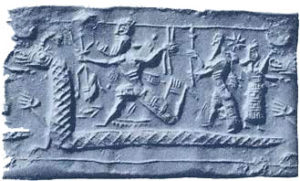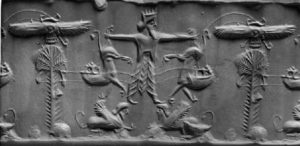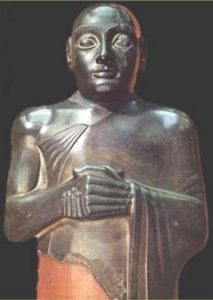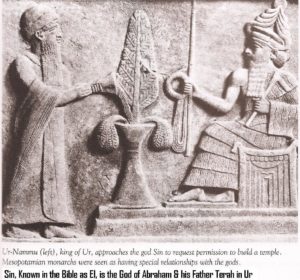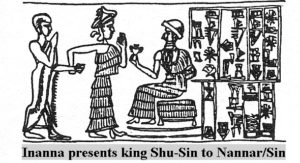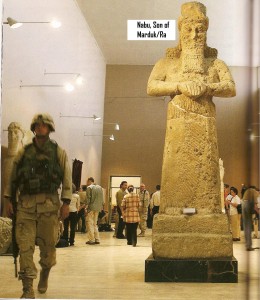http://www.gatewaystobabylon.com/myths/texts/classic/mardor.htm
A hard-to-get text concerning Marduk (Nibiru), of Assyrian origin. We know that some Assyrian versions of the Enuma Elish have Ashur instead of Marduk as the protagonist. Here, Ashur is the protagonist, and Ishtar (Inanna) of Nineveh is explained as Tiamat. The Assyrians regarded Ashur as another name for Anshar, Tiamat‘s grandson, thus closer to Tiamat and worthier of worship than Marduk.
H. Zimmern saw in the text an account of death and resurrection of Marduk (Lishtar´s Note: which took actually place during the Akitu, or New Year´s Festival). Von Soden, another scholar, pointed out that the events in the text were to be associated with the destruction of Babylon in 689 B.C., and the deportation of the statue or symbol of Marduk to Assyria.
(Texts: All Artifacts, Color Coding, & Writings in Bold Type With Italics Inside Parenthesis, are Added by Editor R. Brown, not the Authors, Translators, or Publishers!)
(gods in blue)
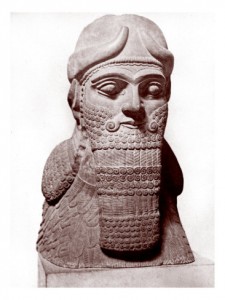
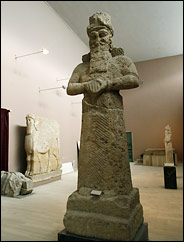 (Nabu, 3rd son to Marduk, helped Marduk with many battles against their cousins)
(Nabu, 3rd son to Marduk, helped Marduk with many battles against their cousins)
1. Nabu,who comes from Borsippa. He comes to greet his father (Marduk), who has been taken captive.
2. Nabu, who turns back and goes to Borsippa, and sprinkles here and there stamens of the date palms there. That is the rebellion ……
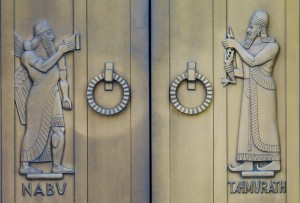 (winged Nabu & unidentified on Library of Congress door)
(winged Nabu & unidentified on Library of Congress door)
3. The pig reeds in the path of Nabu. When he comes from Borsippa and blesses.
4. Nabu, who comes, stands over, and watches. : He is the criminal who is with Bel ….. Because he is with Bel (Marduk)
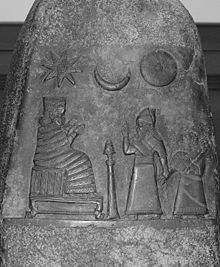 (Nabu‘s spouse, Tashmetu / Nanaya, giant Anunnaki goddess, & smaller king with spouse)
(Nabu‘s spouse, Tashmetu / Nanaya, giant Anunnaki goddess, & smaller king with spouse)
5. Tashmetu (“lady who listens”, Nabu‘s spouse), who bows down with him. She has come to greet him.
6. The Lady of Babylon, who does not go to the Akitu temple. She is the governess of the temple …… “You know the temple. Guard the temple! I hold you responsible for it.”
7. She is the governess of the temple. They ask her, “Who is the criminal?”
8. The Lady of Babylon on whose back is black wool, and on her front multicolored wool…….: ….. on her front is the blood of the heart which was shed …….
9. Sakkukutu (unidentified), who goes round the city. : She is his wailing woman, and goes round the city.
10. ……. is the criminal who was present with Bel. : They Ashshur …..
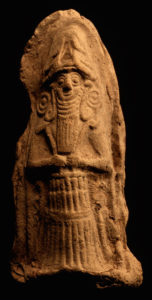
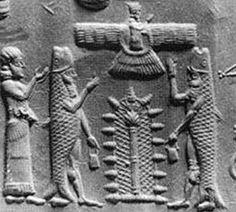 (Anu, alien father of the gods; Anu in his winged sky-disc)
(Anu, alien father of the gods; Anu in his winged sky-disc)
11. ……. they have killed the daughter of Anu ……
12. …… because of the god … encircles, they demonstrate.
13. ….. the ….. of the districts ……
14. The exorcists, who go in front of him reciting an incantation. They are his people, and go in front of him calling out.
15. The ecstatic, who goes in front of the Lady of Babylon (Sarpanit). He is a bringer of news and weeps on her breast.
16. The athletes, who stand at the gate of Esagil. : They are his guards, are appointed over him and guard him.
17. … in the battle …..
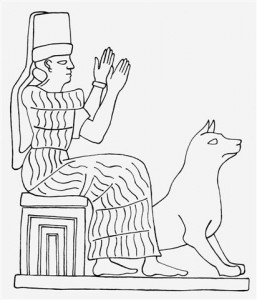
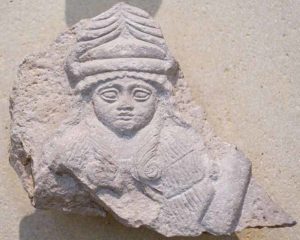 (Bau / Gula on her throne with her guard dog; Bau)
(Bau / Gula on her throne with her guard dog; Bau)
18. The dog, which crosses Esabad. He is a messenger. Gula (Bau) sends (to inquire) about him.
19. Enuma Elish (SEE TEXT ON MARDUK‘S PAGE), which is recited and which they chant in front of Bel in Nisan. : That concerns the prisoner.
20. …. they sing ……
21. He says prayers and makes supplications to them. He recites that before Shamash (Utu): “They were favors for Ashshur (Ashur). I did them. What is my crime?”
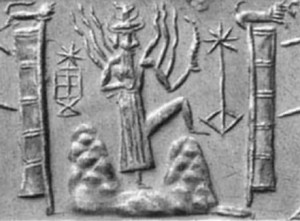
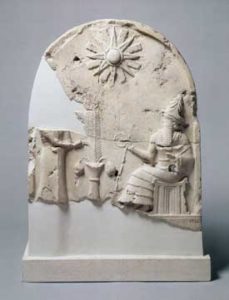
(Utu cuts launch pads with launch towers into the mountains; mixed-breed king stands before Utu, the alien giant & Sun god)
22. ….. which in the rays of Shamash (Utu the Sun god)….
23. …. who scans the heavens. She is praying to Ashshur (Ashur), Anu, Sin (Nannar), Shamash (Utu), and Adad (Ishkur): “Keep me alive!”
24. …. who scans the ground on which his place of river ordeal has been put down. : Concerning the one who comes from the place of the river ordeal.
25. They carry him to the place of the river ordeal. She gives chase: “My brother, my brother!” ……
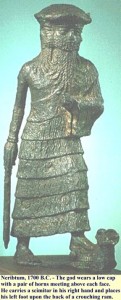 (Marduk, Enki‘s eldest son, patron god of Babylon, standing upon his zodiac symbol Aires the ram)
(Marduk, Enki‘s eldest son, patron god of Babylon, standing upon his zodiac symbol Aires the ram)
26. … Bel went to the place of the river ordeal. : The city has revolted against him and done battle inside. “What is his crime?”
27. ….. who rides. : He goes to the place of the river ordeal.
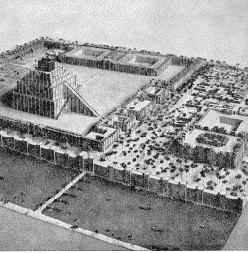 (Marduk‘s ziggurat residence & his patron city of Babylon way below him)
(Marduk‘s ziggurat residence & his patron city of Babylon way below him)
28. ….. who goes. : That is the temple. They question him about it at the edge of the place of the river ordeal.
29. …. who carry. : The criminal …..
30. ….. it is the place on …..
31. …. his … to the place of the river ordeal …
32. .. .. who does not go with him. “I am not a criminal! I will not be made to swear!” With him, on behalf of Ashshur they opened lawsuits before him. The lawsuits ….
33. …. “It is just.”
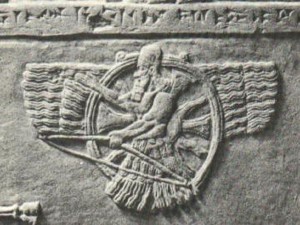 (Ashshur / Ashur / etc., Marduk‘s son in his weaponized winged sky-disc)
(Ashshur / Ashur / etc., Marduk‘s son in his weaponized winged sky-disc)
34. … who does not go with him. He is a son of Ashshur and is a guard. He is appointed over him, and guards the citadel because of him.
35. ….. placed to guard …. goes in front of him.
36. ….. his guard wearing a crown….
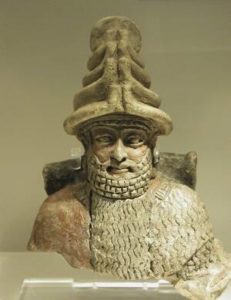
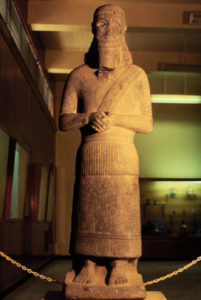
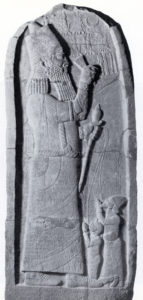 (Shamash / Utu; Adad; & Ashur with mixed-breeds)
(Shamash / Utu; Adad; & Ashur with mixed-breeds)
37. ….. Shamash and Adad that is. From the temple of the prisoner …
38. … he is held fast.
39. …. it concerns the one who is held fast..
40. That which they do on the ziggurat. : Because the god imprisoned him he disappeared and was held inside.
41. … which they place, responsibility … in the ladles.
42. …. there is not. He is present. Responsibility …..
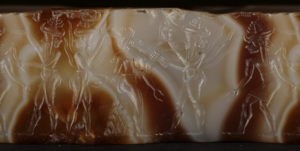 (alien giant gods in combat with each other)
(alien giant gods in combat with each other)
43. …. she makes carry to him, to the temple of his imprisonment …..
44. …. because it is not old …. as his name.
45. …. who does not go out with Bel to the Akitu temple. He holds the fetter of the prisoner … with him.
46. …. to the place of the river ordeal he goes. In the Akitu temple……
47. The man who on the 7th day of the month….
48. …. who slaughters a pig in front of her on the 8th of Nisan.
49. It is said in Enuma Elish (SEE TEXTS ON MARDUK‘S PAGE): When heaven and earth were not created, Anshar came into being. When city and temple came into being, Anshar had come into being. The water which over Anshar …..
50. All the speech which is recited among the lamentation priests. It concerns the robbery and desecration which they commit against him. They are the gods, his fathers ……
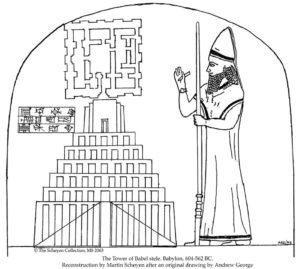 (Esagil, Marduk‘s “holy of holies” within his ziggurat residence / house in Babylon)
(Esagil, Marduk‘s “holy of holies” within his ziggurat residence / house in Babylon)
51. His silver, gold, or gems which they take out of Esagil to other temples. : It is his temple ……
52. ……. whom they make superior ….
53. ….. it is ……. it is plundered …..
54. They make poured offerings from ladles and beakers.
55. ….. who goes. Because her vessel was lifted and he completes
……..: It is in fear. He quickly thirsts for water….
56. ….. is libated ………….
57. …. which he libates and pours. : That is turbid water ……
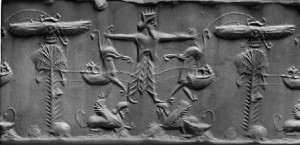 (Marduk between 2 winged sky-discs)
(Marduk between 2 winged sky-discs)
58. ….. who roams the streets. : He is looking for Marduk. “Where is the prisoner?”
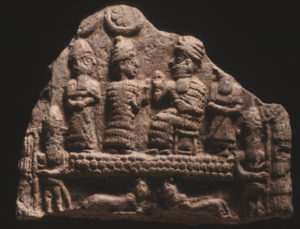 (Utu, twin sister Inanna, father Nannar, & brother Papsukal damaged)
(Utu, twin sister Inanna, father Nannar, & brother Papsukal damaged)
59. The Lady of Babylon, whose hands are stretched out. : She is praying to Sin and Shamash: “Keep Bel (Marduk) alive!”
60. …….s who goes, That is the gate of graves. She goes and looks for him.
61. …… who weep …… who do not weep. It is concerning Marduk ….
62. ….. Keep alive! Do not kill! …..
63. ….. is put down. Let me bear and bury …
64. ….. who goes and puts down.
65. ….. the messenger saves. They send him down from inside.
66. ….. who opens, the urn ….
67. …… whom Ashshur will kill …
68. That is the day of his crime. It is gathered in the chamber. Without water. He is clothed. Chamber……
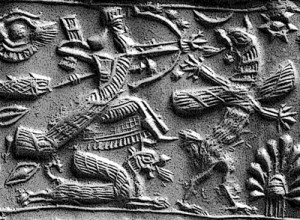
(Ninurta in his winged “storm bird” shoots down winged Anzu, in his failed coup attempt, here portrayed as a demon bird)
69. The race which is in Kislimu, and in which they go round in front of Bel and in all the cult places. : When Ashshur sent Ninurta to defeat Anzu. Nergal …. spoke before Ashshur, “Anzu is defeated”. Ashshur said to the god ….. “Go to all the gods and give the news.” He gives the news to them and they in ….. they rejoiced.
70. …. he the cult places …..
71. …. she comes round from the city …..
72. ….. He is a messenger …. He goes round the city.
73. … he makes him go out….. not the messenger of his lords. Who makes him go out? ….. who goes, who makes him go out.
74. Grain, which is extremely plentiful in Nisan. : It is grain of when he was taken prisoner.
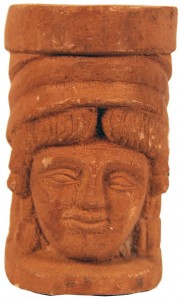
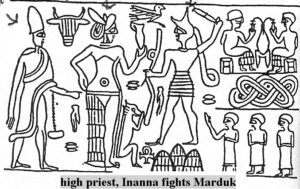 (Ishtar / Inanna, Goddess of Love & War)
(Ishtar / Inanna, Goddess of Love & War)
75. The milk, which they draw in front of Ishtar (Inanna) of Nineveh. : Because she brought him up and showed compassion to him.
76. The moistened roasted flesh which they place in front of Marduk.: It is of the darkness (?)
77. It is of the darkness (?) …..
78. ….. who cuts, darkness (?) ….
79. The water for (washing) the hands which they bring near. : It is because he wept. His tears inside….
80. The garment which is on him. : What they say, that is water, those are drops.
81. The garment in which he is clad. : He is in the chamber.
82. ….. It is his mattress ….
83. The shoe which they take to the temple of the Lady of Babylon. It is a standard. He sends it to her because they will not release him and he cannot go out.
84. His clothing, which they send to the Lady of Uruk (Inanna). They are his cloaks. They carried them off.
85. …. concerning the dead one …. the saddle beneath him (and) the multi-colored wool with which he is clad. They are the blows which were struck. They are dyed in his blood.
86. …. all which the cloak …. …… the temple …
87. …. does not go. They …. his garments. He has disrobed ….
88. … which hangs from the beam of the Lady of Babylon. That is the head of a criminal who was present with him and whom they killed. They have hung his head on the neck of the Lady of Babylon.
89. The lattice door. : As they say, the gods have taken him captive and he has entered the temple and locked the door behind him. They bored holes in the door and did battle.
90. The chariot, which goes to the Akitu temple. It goes with no driver. Without a driver, it rocks about.
91. ….. he ….. not in honor of them.
92. ….. oil ……. lasting……
(end of extant text)
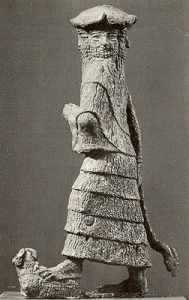 (Marduk, patron god of Babylon with foot upon his zodiac symbol of Aires the Ram)
(Marduk, patron god of Babylon with foot upon his zodiac symbol of Aires the Ram)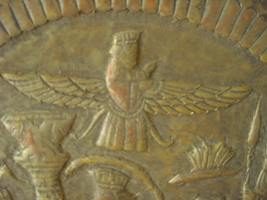 (Marduk‘s grandfather Anunnaki King Anu in his winged sky-disc)
(Marduk‘s grandfather Anunnaki King Anu in his winged sky-disc)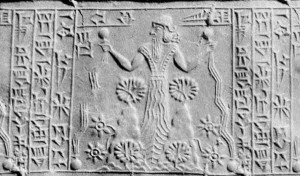 (Marduk, patron god of Babylon & then Egypt)
(Marduk, patron god of Babylon & then Egypt)






















